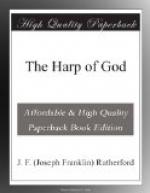[80]The eternal torment teaching is not supported by any Scripture text in the Bible. There are some texts that are written in symbolic phrase, parables and dark sayings, which were written to illustrate another great truth, but with no reference to the eternal punishment of the human race. These Scriptures must be considered elsewhere. Our space does not permit us to consider them here. What we will examine are the direct Scriptural statements.
[81]All the Scriptures show that the wicked will be punished, but punishment does not mean torment. There is a wide distinction between everlasting punishment and everlasting torment. Everlasting punishment is a punishment that lasts. Everlasting torment would be a torment that never ends, but one would be consciously suffering all the time. The laws of the land punish the wicked who violate the law, and the duration of punishment is short or long in proportion to the enormity of the crime committed. One who steals a loaf of bread violates the law and he may be punished by confinement for a day or a month in prison. One who destroys his neighbor’s house by fire is punished, and his punishment may be a number of years in prison. Another takes the life of his neighbor, and his punishment is death. No law of any nation on earth permits the violator of the law to be tormented. The stealer of bread is punished for a short period; the one who destroys the home is punished for a longer period; and the one who takes his neighbor’s life deliberately is punished by the full penalty of the law, and his punishment is lasting. Death is the highest penalty inflicted by the law. It is also the greatest punishment inflicted by Jehovah. Life is the dearest thing to any creature, and to be deprived of life would be the greatest punishment that could be inflicted. Therefore eternal or everlasting death, with no hope of a resurrection, would be an everlasting punishment. But it would not be an everlasting conscious torture. God plainly declared: “The wages of sin is death” (Romans 6:23), and not eternal torture.
[82]Having fixed this penalty, God could not change it afterward, because God could not be inconsistent; he cannot deny himself. (2 Timothy 2:13) It was by the disobedience of one man that sin came into the world and death as the result of sin; so death has been the penalty upon all mankind. (Romans 5:12) And this will continue until God’s due time to awaken them out of death and give all an opportunity for life; and this we will discuss later. “The Lord preserveth them that love him, but all the wicked will he destroy.” (Psalm 145:20) The Apostle plainly says that all the wicked shall be punished with an everlasting destruction.—2 Thessalonians 1:9.
[83]But do not the wicked go to hell?




